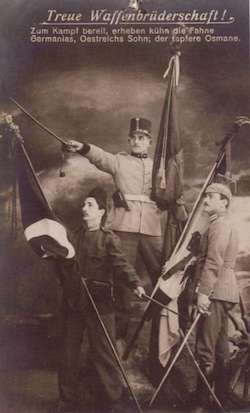 On the brink of the First World War, the Ottoman Empire stood in a precarious position. The empire had emerged from a decade of nearly continuous wars, the Italo-Turkish War in North Africa and the Balkan Wars, that had stripped it of territories, drained its finances, and left its people weary and disillusioned. Internally, it faced economic fragility, outdated institutions, and a pressing need for reform. Yet just as the government sought space to recover and modernize, Europe hurtled toward war. For the Ottomans, neutrality seemed desirable in theory but unfeasible in practice. The empire lacked armaments, industrial capacity, and financial resources. If it was to survive and secure the means for modernization, it had to seek the protection of a powerful European ally.
On the brink of the First World War, the Ottoman Empire stood in a precarious position. The empire had emerged from a decade of nearly continuous wars, the Italo-Turkish War in North Africa and the Balkan Wars, that had stripped it of territories, drained its finances, and left its people weary and disillusioned. Internally, it faced economic fragility, outdated institutions, and a pressing need for reform. Yet just as the government sought space to recover and modernize, Europe hurtled toward war. For the Ottomans, neutrality seemed desirable in theory but unfeasible in practice. The empire lacked armaments, industrial capacity, and financial resources. If it was to survive and secure the means for modernization, it had to seek the protection of a powerful European ally.
For the leaders of the Committee of Union and Progress, who had come to power after the 1908 revolution and consolidated control through the 1913 coup, the empire’s predicament was existential. Without foreign support, they believed, the Ottoman state would be unable to preserve its independence. The empire’s geostrategic location ensured that it could not be ignored, as it straddled Europe and Asia, controlled the Straits, and bordered Russia, the British Empire in Egypt and the Persian Gulf, and French influence in North Africa. Yet geography, while a source of importance, was also a source of peril. All of the great powers coveted Ottoman lands, and few had an interest in preserving the empire intact.
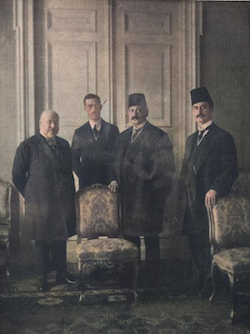
It was in this context that the Ottomans embarked on a desperate search for allies. Neutrality might have been the ideal option, offering the empire the respite it needed for recovery. By staying out of the impending European conflict, the empire might have secured time to rebuild its army, reform its administration, and revive its economy. But neutrality was never realistic as the empire lacked the resources to deter its rivals and the diplomatic capital to remain untouched in a world moving inexorably toward war. The Straits connecting the Black Sea and the Mediterranean were vital to Russian trade and security. Britain viewed the Ottoman position in the Persian Gulf and Mesopotamia as directly affecting its route to India. France regarded Syria and Lebanon as within its cultural and commercial sphere of influence. The Ottoman Empire’s very location ensured that both the Entente and the Central Powers saw its alignment as crucial. To attempt neutrality without the backing of a major power would have been to invite partition. The leaders of the Committee of Union and Progress recognized that an alliance with a major power bloc was unavoidable. The central question was not whether to ally, but with whom.
"Turkey had to align itself with one of the blocs in order to undertake vital domestic reforms, invigorate its trade and industry, expand its railway networks, and essentially, to endure and safeguard its existence." (Talat Pasha in his memoirs)
The challenge lay in the fact that the European powers were not particularly enthusiastic about forming an alliance with the ailing Ottoman Empire. At the outset of the Turco-Italian War in North Africa, Grand Vizier Sait Halim Pasha had conveyed the government's interest in establishing an alliance, and Turkish diplomats were tasked with gauging the interest of European capitals. It appeared that only Russia displayed some interest, albeit under terms that essentially implied a Russian protectorate over Ottoman territories.
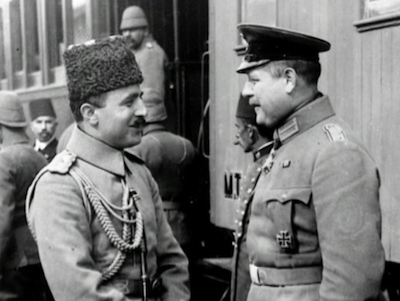
Over time, differing viewpoints emerged within the Ottoman government regarding which group of powers the Empire should approach for an alliance. The majority among the government, the moderates, favoured an alliance with Britain and France, as they perceived these countries as posing the most significant threat to the Empire. In contrast, the extremists saw advantages in aligning with Germany and Austria-Hungary.
The moderates held the belief that Germany and Austria, due to their geographical positioning, did not pose a direct threat, and aligning with the Entente would reduce the peril faced by the Ottoman Empire. Beginning in 1911, informal approaches were made. Cavid Bey wrote to Winston Churchill, then First Lord of the Admiralty, signaling Ottoman interest in cooperation. In 1913, the Ottoman ambassador in London, Tevfik Pasha, formally requested an alliance. These overtures were not without substance. The Ottomans offered Britain access to railway projects in Mesopotamia, navigation rights on the Tigris and Euphrates, and a sphere of influence in Kuwait. Yet Britain declined. To London, the Ottomans were an unreliable partner and a declining power. More importantly, Britain’s alliance with Russia was central to its European strategy, and Russian hostility toward the Ottomans made an Anglo-Ottoman understanding impossible.

France was the next avenue. Cemal Pasha, Minister of the Navy and chairman of the Turco-French Friendship Association, travelled to Paris in July 1914 to explore possibilities. His personal ties to French officers and his command over naval cooperation projects gave him confidence. Instead, he was met with a blunt refusal. The French government insisted that no agreement could be made without Russian approval. Since Russia was determined to pursue its ambitions in the Straits, French alignment with St. Petersburg closed the door. Cemal left Paris bitterly disappointed, realizing that his pro-French orientation had no future.
Russia, paradoxically, was also approached. In May 1914, Talat Pasha travelled to Crimea to meet Foreign Minister Sergei Sazonov. He attempted to persuade the Russians that preserving the Ottoman Empire could serve their interests. But Russia, long focused on securing Constantinople and the Straits, had little incentive to guarantee Ottoman survival. Sazonov was polite but firm, Russia’s priorities lay in its alliance with France and Britain, not in rescuing a faltering empire.
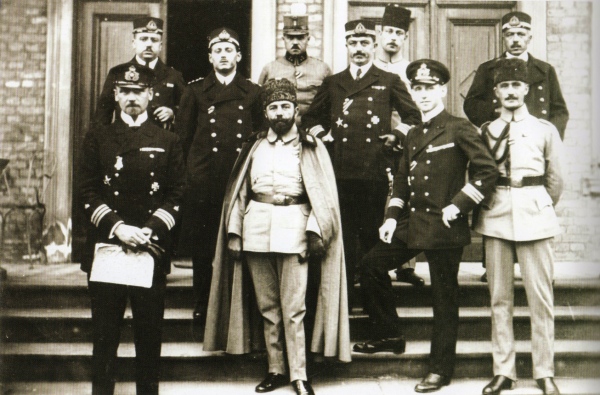
These failures underscored a painful truth. The Entente powers valued Ottoman territory but not Ottoman sovereignty. Their interest was not in preserving the empire as a strong, independent partner, but in keeping it weak until the time came for partition.
The rejection by the Entente powers sharpened internal divisions within the Ottoman leadership. Moderates such as Cavid Bey favored continued neutrality, believing that aligning with Germany would tie the empire’s fate to a single power and expose it to ruin if Germany lost. They preferred to keep diplomatic channels open and to avoid binding commitments.
The government's extremists, including Enver Pasha himself, were in favour of aligning with Germany, as they believed that Germany possessed the most formidable army in Europe. They held the belief that Germany had no territorial ambitions within the Ottoman Empire, and thus, in comparison to the Entente powers, would pose a lesser threat to the Ottoman Empire if they emerged victorious in the war. They saw an alliance with Germany as a means to potentially safeguard the Empire from disintegration and even enhance its standing in the event of a German victory. Cemal Pasha, who had previously leaned towards an alliance with the Entente, reflected in his memoirs:
"Germany can safeguard its interests only by ensuring the strength of Turkey. Germany is not in a position to subdue Turkey as a colony, as both its geographical limitations and available resources render such an endeavor unfeasible. Hence, Germany is opposed to the partition of Turkey by the Entente powers, as Turkey provides a market that could be connected to its own. The disappearance of Turkey would leave Germany encircled within the steel ring of the Entente. To avert this outcome, Germany must guarantee the preservation of Turkey's territorial integrity." (Cemal Pasha in his memoirs)
By that time, Germany had already established a substantial presence within the Empire. In 1913, a German military mission was assigned the task of restructuring the Ottoman army, and Germany had become deeply engaged in the Ottoman economy. Additionally, the German military leadership recognized the significant strategic value of the Ottoman army's active involvement in the impending conflict. However, the German government displayed reluctance in formalizing a military alliance with the Ottoman Empire. Many officials in Berlin regarded the Ottoman Empire as a liability. Its army was weak, its finances bankrupt, and its politics unstable. General Helmuth von Moltke dismissed it as “a dying man,” unlikely to contribute meaningfully to Germany’s war effort. This is why when, on 22 July 1914, Enver Pasha proposed an alliance to the German Ambassador, Hans von Wangenheim, the proposal was rejected.
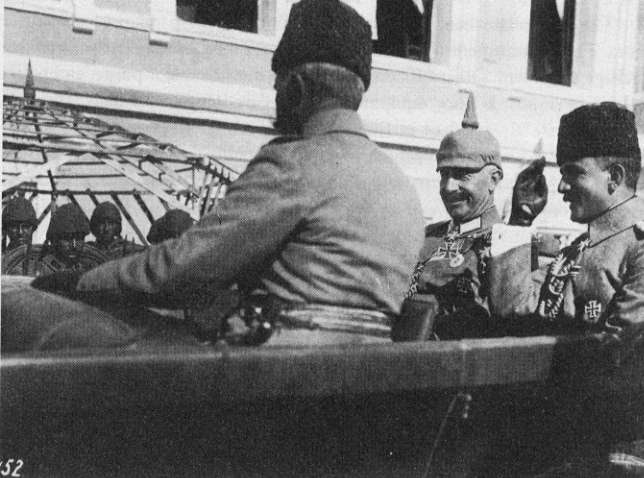
Kaiser Wilhelm, however, had a different view. Recognizing an opportunity in having the Ottoman Empire as part of the Central Powers, overruled the ambassador's decision. Despite the Ottoman army's relative weakness, it still had the potential to create substantial concern for the Entente by launching attacks on British holdings in the Middle East and Russian territories in the Caucasus. The Kaiser's aim was to open additional fronts against the enemy and exploit all available means at their disposal. He instructed Wangenheim to sign the alliance treaty under the condition that the Ottoman Empire would swiftly take action against Russia, which it eventually did. The alliance was formalized on 2 August 1914, even as Germany was already engaged in the war.
The alliance treaty was signed under strict confidentiality, with only five individuals in Turkey privy to its existence. Cavid Bey criticized it, contending that it would subordinate the Empire to German interests. On the contrary, Cemal Pasha, who learned about the treaty a day after its signing, welcomed the Empire's alignment with one of the two major power blocs. Sait Halim Pasha held a more naive perspective, hoping the treaty would enable the Empire to maintain its neutrality in the war, although this expectation was evidently unfounded. In contrast, Talat Pasha and Enver Pasha understood that the document would draw the Ottoman Empire into the war. For Talat, it was a calculated risk, recognizing that they had little chance of staying out of the impending conflict. However, a potential German victory held the promise of rescuing the Empire from the dire straits it was in. For Enver, siding with the Germans also aligned with his aspirations for pan-Turkic objectives in Asia.
At that juncture, the moderates in the government displayed little enthusiasm for taking sides in the war; their primary goal was to exploit the international situation to secure full independence and concentrate on domestic reforms. They aimed to reassure the Entente that the Ottoman Empire would maintain its neutrality. In contrast, the extremists were inclined towards participating in the conflict.
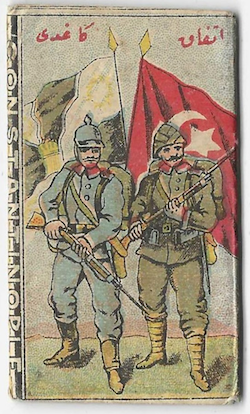 Just a few days after the Turco-German treaty was officially sealed, Enver made a surprising overture to the Russian military attaché in Istanbul, General Leontieff. He proposed a potential Turco-Russian alliance in exchange for the recognition of the Ottoman Empire's independence and a favorable reconfiguration of the Balkan map in its favour. The Russian side did not outright reject the offer, but they refrained from entering into any formal commitment. It remains uncertain whether Enver intended to buy time or genuinely contemplated aligning with Russia and joining the war against the Central Powers.
Just a few days after the Turco-German treaty was officially sealed, Enver made a surprising overture to the Russian military attaché in Istanbul, General Leontieff. He proposed a potential Turco-Russian alliance in exchange for the recognition of the Ottoman Empire's independence and a favorable reconfiguration of the Balkan map in its favour. The Russian side did not outright reject the offer, but they refrained from entering into any formal commitment. It remains uncertain whether Enver intended to buy time or genuinely contemplated aligning with Russia and joining the war against the Central Powers.
As the hostilities on the European continent were already underway, there was a contentious debate within the Ottoman government between the moderates and the extremists regarding whether the Ottoman Empire should enter the war or maintain a position of neutrality. In late October 1914, the decision was significantly influenced by a fait accompli: a German admiral, commanding two ships, Goeben and Breslau, sailed them to the Black Sea under the Turkish banner and initiated a bombardment of Russian ports. The bombardment forced Russia to declare war, followed by Britain and France. With that, the Ottoman Empire was irrevocably drawn into the conflict.
The Ottoman Empire’s search for allies was not a carefully calculated strategy but a desperate gamble born of weakness. The Entente powers dismissed its overtures, preferring to preserve their own alliances and prepare for partition. Internal divisions sharpened, but ultimately the radicals led by Enver prevailed, persuaded that Germany was the “least dangerous” choice.
For Germany, the alliance was initially undesirable but ultimately accepted for strategic reasons. For the Ottomans, it was both a lifeline and a trap. The alliance prolonged the empire’s existence in the short term, tying it to a powerful protector. Yet it also ensured that defeat in the global war would bring catastrophe. The Ottoman Empire was too weak to stand alone, too mistrusted to attract partners, and too entangled in global rivalries to remain neutral. The decision to side with Germany was the only option left, but it came at the highest possible cost.
![]()
PAGE LAST UPDATED ON 29 AUGUST 2025